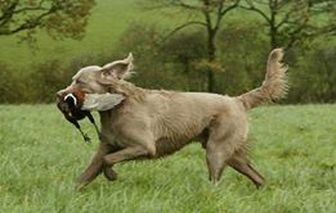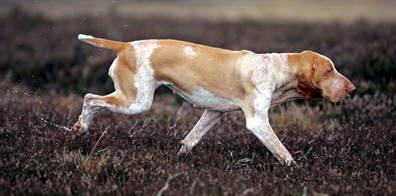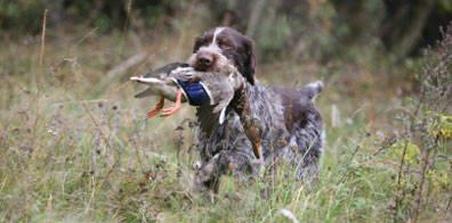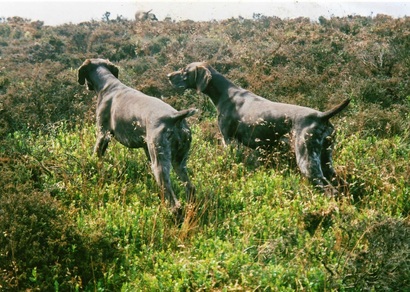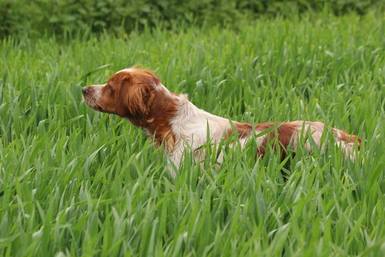
One of the early documents in the Association’s archive is a hand written paper by Lord Joicey. This appears to be the basis of a speech he was to make, where he documented the need for a consultative committee for breeds which Hunt, Point and Retrieve. At that time he raised a number of concerns which needed addressing by such a collective organization, rather than being dealt with by individual breed clubs. The idea was that a representative from each HPR club/society would meet regularly to discuss issues surrounding the HPR Group.
In his paper Lord Joicey noted that, 'ten years ago' (I can only assume this refers back to the early 1970s), only the GSP Club ran Field Trials and consequently this was the only Club concerned with formulating rules for Field Trials and training judges. He further commented that the ‘Guide for Field Trial judges for GSP Club Trials’ had been adopted by the Kennel Club as their own ‘Guide for Field Trial Judges' for the group of gun dogs known as the breeds which Hunt, Point and Retrieve. There appeared to be certain aspects of the rules and regulations that might have required some updating and reviewing for relevance, particularly in light of the many different breeds and their different working styles, which were then competing in trials. He was sufficiently moved to ask: “Are all the various breeds involved today happy that the rules, written for GSPs, are equally applicable to them, or would they like some amendments?”
Interestingly, he then wrote of the possibility of the HPR Group running their own Championship Stake. But it appears that there was some concern about this. He commented:
“...the majority of members of the Field Trial Committee of the Kennel Club are not sympathetic to the holding of a Championship Stake at the present time [early 1980s]. The standard of work at one day trials, which has come to the notice of various members of the Kennel Club Field Trial Committee at various times, has not been good and thus giving rise to the feeling that it is too early in the career of the HPR Group to hold a Championship Stake. This may be of particular interest, to those, who like myself, may also have heard the well-used anecdote that, ‘the standard was considerably better in by-gone years, than in recent ones’!? "
In 1982 clubs held a meeting which was attended by representatives of each breed club in the HPR Group who were empowered on behalf of their breed clubs to agree terms for the formation of an Association. In a letter sent to the Kennel Club , announcing the formation of the Association, they commented:
“The outcome was that the representatives unanimously agreed on the formation of a formal Association much in keeping with that proposed by yourself, during our visit in July 1981.”
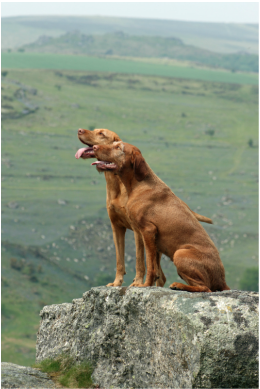
This suggests the Kennel Club was fully supportive of the original formation of the HPRFTA and to some degree had been instrumental in its creation. Suggestions that the Kennel Club and the HPRFTA did not share a happy relationship seem unfounded, therefore.
Within four years the Association was organising the first HPR Championship.
So to summarise;
§ The HPRFTA was formed in 1982 by Lord Joicey and the two leading GSP Breed Clubs at the
behest of the ‘minor’ breed clubs.
§ The purpose in forming the Association was to provide a forum for HPR Breed Societies/Clubs
and offer them the ability to voice their opinions and participate in new initiatives.
§ One of the HPRFTA’s major achievements was to run the first Championship Stake for the HPR Group in 1986.
Today, the core objectives of the HPRFTA are much the same as they were when it was originally formed;
a) To encourage and promote discussion between subscribing Clubs and Societies on subjects of common interest concerning Field Trials.
b) To present the Kennel Club a united viewpoint of HPR Field Trial matters.
c) To organise a conference when required on Field Trials matters.
d) To facilitate the training of aspiring HPR Field Trial Judges.
e) To hold handlers field craft seminars.
f) To improve communication between HPR Field Trial Secretaries through a FTS conference.
Over the years the HPRFTA has achieved much! If the Association works to aid the Group and any problems or concerns are shared and resolve within it, then surely it must be a valuable asset to the Group. After all, the HPRFTA is merely an extension of the breed Societies and Clubs who run HPR field trials - a forum where ideas can be shared, concerns and problems discussed, consistency maintained across the Group and a committee for like-minded people to work together for the benefit of many!
Since 2006 the HPRFTA has run training Seminars for Non-Panel judges. These days have proved very successful. They have given 'would be judges the opportunity to review different breeds from the HPR Group, under supervision and guidance of HPR A-Panel judges. participants are nominated by Breed Societies and Clubs who run Field Trials and those attendees are required to already have some experience judging or shadowing Pointing Tests. Indeed, some of the attendees have now gone on to join the B-Panel and A Panel list of judges.
In 2007 the HPRFTA were the first to run one of the Kennel Club's Rules and Regulations Seminars, which was aimed at Non-Panel judges. In the future, entry onto the 'B-Panel List of Judges' will require aspiring judges to attend such a seminar and the pass the examination.
The Association is an investment in field trialling in the United Kingdom and the representatives from your Breed Clubs and Societies who attend have the opportunity to participate and contribute for the sake of their working breeds.
If your Society or Club is not a member then perhaps you might wish to ask why?
Within four years the Association was organising the first HPR Championship.
So to summarise;
§ The HPRFTA was formed in 1982 by Lord Joicey and the two leading GSP Breed Clubs at the
behest of the ‘minor’ breed clubs.
§ The purpose in forming the Association was to provide a forum for HPR Breed Societies/Clubs
and offer them the ability to voice their opinions and participate in new initiatives.
§ One of the HPRFTA’s major achievements was to run the first Championship Stake for the HPR Group in 1986.
Today, the core objectives of the HPRFTA are much the same as they were when it was originally formed;
a) To encourage and promote discussion between subscribing Clubs and Societies on subjects of common interest concerning Field Trials.
b) To present the Kennel Club a united viewpoint of HPR Field Trial matters.
c) To organise a conference when required on Field Trials matters.
d) To facilitate the training of aspiring HPR Field Trial Judges.
e) To hold handlers field craft seminars.
f) To improve communication between HPR Field Trial Secretaries through a FTS conference.
Over the years the HPRFTA has achieved much! If the Association works to aid the Group and any problems or concerns are shared and resolve within it, then surely it must be a valuable asset to the Group. After all, the HPRFTA is merely an extension of the breed Societies and Clubs who run HPR field trials - a forum where ideas can be shared, concerns and problems discussed, consistency maintained across the Group and a committee for like-minded people to work together for the benefit of many!
Since 2006 the HPRFTA has run training Seminars for Non-Panel judges. These days have proved very successful. They have given 'would be judges the opportunity to review different breeds from the HPR Group, under supervision and guidance of HPR A-Panel judges. participants are nominated by Breed Societies and Clubs who run Field Trials and those attendees are required to already have some experience judging or shadowing Pointing Tests. Indeed, some of the attendees have now gone on to join the B-Panel and A Panel list of judges.
In 2007 the HPRFTA were the first to run one of the Kennel Club's Rules and Regulations Seminars, which was aimed at Non-Panel judges. In the future, entry onto the 'B-Panel List of Judges' will require aspiring judges to attend such a seminar and the pass the examination.
The Association is an investment in field trialling in the United Kingdom and the representatives from your Breed Clubs and Societies who attend have the opportunity to participate and contribute for the sake of their working breeds.
If your Society or Club is not a member then perhaps you might wish to ask why?

